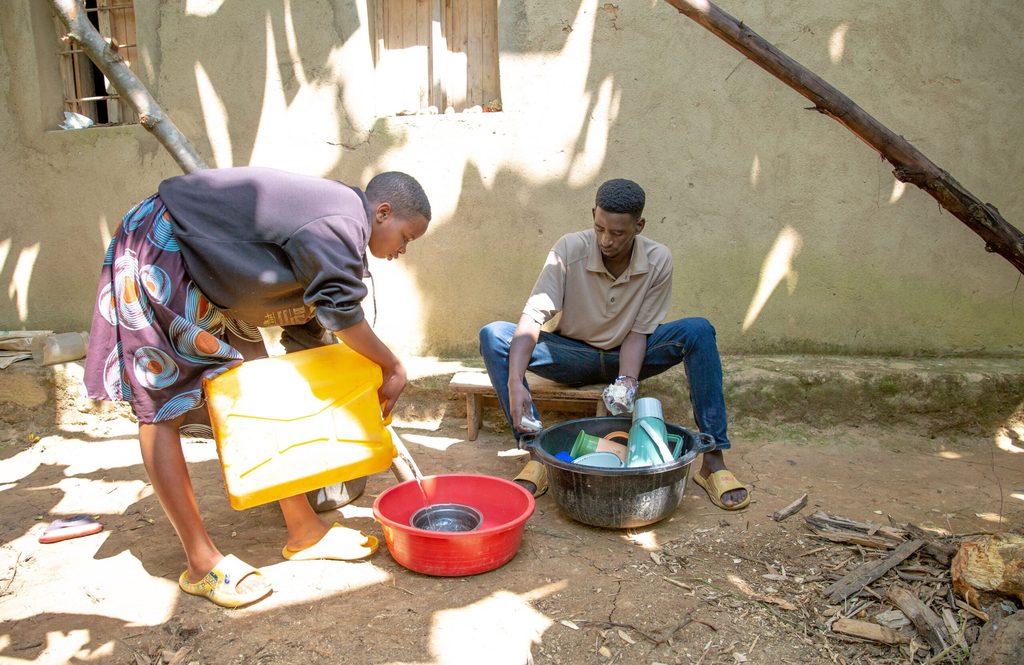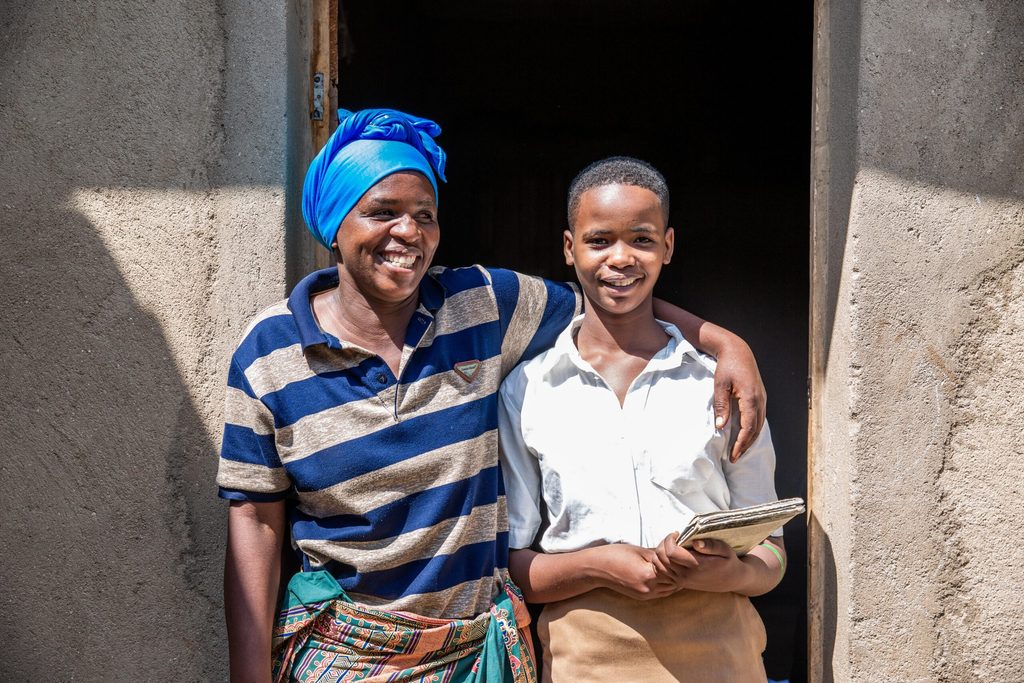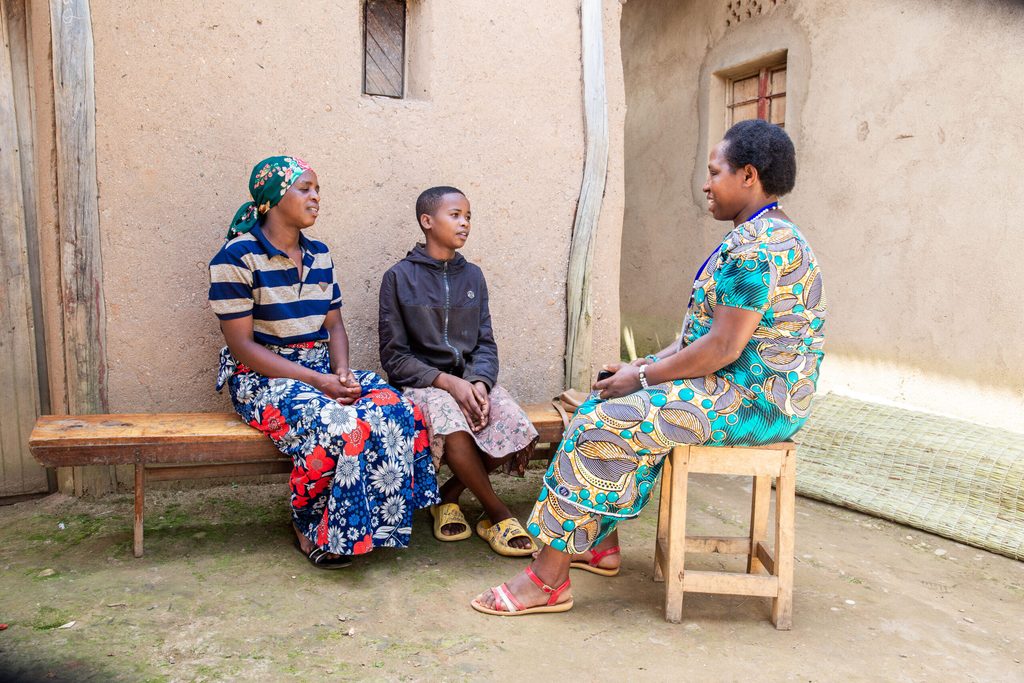Sixteen-year-old Proby, the only daughter among 4 siblings, faced gender norms within her family. Despite being burdened with household chores and meeting her brothers’ demands as cultural expectations for a young girl, she raised awareness on children’s rights with her parents at home.
It all began when Proby was assigned all household tasks by her mother, Alphonsine, such as fetching water using unwieldy jerry cans, washing dishes, cleaning the house, and helping with meal preparation. Her mother believed in raising her daughter to become an exemplary future mother, in line with cultural norms where domestic responsibilities were traditionally shouldered by girls or women.

“I confronted my mother about the inequality issue for household chores and she eventually agreed to change,” says Proby.
Why it’s essential for children to know their rights
Initially, Proby was unaware of children’s rights. As she recalls, she would humbly do whatever was assigned to her by anyone without question, no matter how hard, good or bad it was.
A turning point came when she was in her 2nd year of secondary school, discussing with classmates the importance of participating in school clubs to acquire new skills and knowledge. One key club that captivated her was: “The school club that strives for children’s rights.”
Since then, Proby was curious to know what the club was dealing with.
Joining the club empowered her to open discussions with her parents, especially her mother, with whom she spent most of her time.
“Learning children’s rights revealed to me how my family was violating my rights, especially in terms of equal treatment among my siblings. It was quite important for me as a very young girl child.”
Proby, 16
“Learning children’s rights revealed to me how my family was violating my rights, especially in terms of equal treatment among my siblings. It was quite important for me as a very young girl child.”

By excelling in public speaking, boosting her confidence to address issues like child rights and violence against children, understanding reporting pathways, building self-esteem, articulating her ideas, and recognising her responsibilities as a child, Proby has brought about positive change in her home today.
“Children need allies that create open dialogues, enabling them to share their ideas, and personal challenges. Many of us suffer in silence and fear. Now, my brothers and I share household tasks more fairly.”
Proby, 16
“Children need allies that create open dialogues, enabling them to share their ideas, and personal challenges. Many of us suffer in silence and fear. Now, my brothers and I share household tasks more fairly,” Proby explains.
Today, studying in her third year of secondary school, she stands as a testament to the power of education and advocacy in transforming lives and challenging harmful cultural norms.
Advocating for parental education on child rights
Alphonsine, Proby’s mother, highlights the crucial role of parental education on children’s rights, serving as a catalyst for positive changes in families.
As a mother of 4, she faced significant challenges due to her limited education, having dropped out of primary school early. This, combined with cultural beliefs, left her with little knowledge about her children’s rights as well.

Through her daughter Proby, Alphonsine discovered the urgent need for parents to be educated on child protection.
“Parents need education programmes on child rights to ensure their awareness. The blend of cultural and gender norms significantly impacts families’ well-being, often leading parents to unknowingly violate their children’s rights.”
Alphonsine
“Parents needs education programmes on child rights to ensure their awareness. The blend of cultural and gender norms significantly impacts families’ well-being, often leading parents to unknowingly violate their children’s rights,” Alphonsine affirms.
Proby, her parents and brothers now dedicate a time each evening to discuss all the challenges that their family faces.
Plan International’s contribution
Plan International Rwanda was awarded a grant by the Swedish International Development Cooperation Agency for a project titled “Strengthening Child Protection and Sexual, Reproductive, Health and Rights in Rwanda” for 5 years, under Generation Change Programme (GCP) 1.0.
The project’s goal is to create a conducive environment where vulnerable children, adolescent and young people including those with disabilities, especially girls, are equally cared for, protected from all forms of violence, and supported to make informed decisions about their sexuality and reproduction.
“Ensuring successful child protection creates a safer society with families having brighter futures. Children are fundamental to a better future for society. When deprived of their rights, the foundation of society fails,” states Edison Mugabo, the Project Manager.
Throughout 5 years, under the child protection thematic area, the project has reached 1,644 females and 1,142 males across Gatsibo, Bugesera, and Nyaruguru districts. We believe these individuals can be model catalysts for the change needed in their communities if supported.
This project is being implemented in partnership with 4 local organisations: Collectif des Ligues et Associations de Défense des Droits de l’Homme au Rwanda, Coalition Umwana ku Isonga, Young Women’s Christian Association – Rwanda and Health Development Initiative.